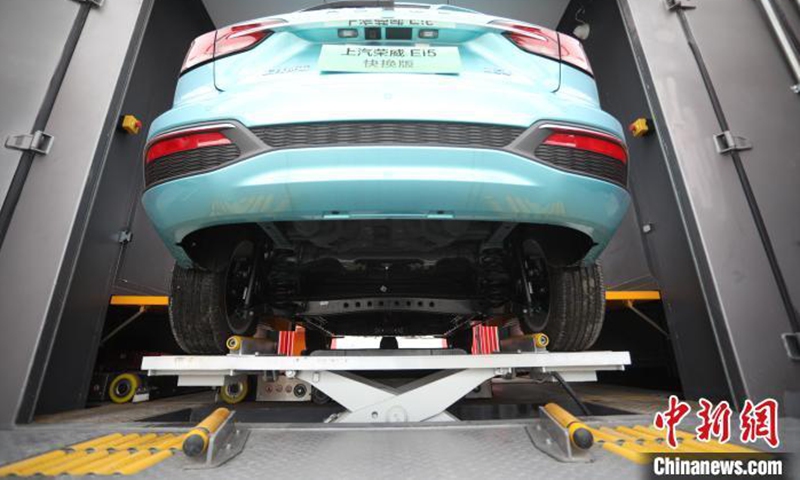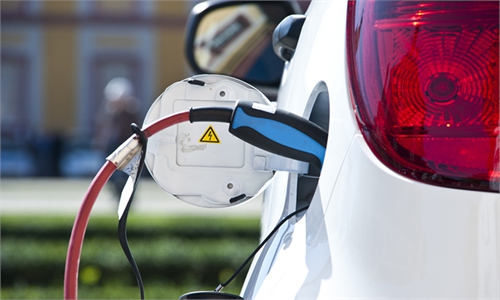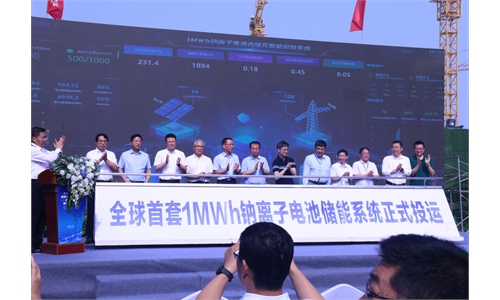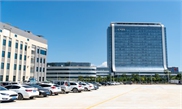China’s EV battery sector sees over 30% supply shortfall despite higher output
Chinese suppliers ramp up output to meet record demand

Photo shows the process of an electric vehicle swapping battery at the first EV battery-swapping station in Shanghai, March 12, 2021.Photo:China News Service
Chinese electric vehicle (EV) battery suppliers can't keep up with record foreign and domestic demand, and the shortfall may reach a record 30-40 percent this year, despite efforts to increase output, industry insiders said on Sunday.
Sales are being driven by soaring global demand for Chinese EV batteries as the country goes greener. Meanwhile, companies are facing production and logistics disruptions of overseas supplies for raw materials. The shortage has also prompted some car companies to place orders months ahead of time.
Amid the massive shortfall, EV battery factories across the country are running at full capacity.
A source with an EV battery producer in East China's Jiangsu Province told the Global Times on Sunday that the company has an annual capacity of around 400 million batteries, and the production lines are at full capacity.
"A new production line with a capacity of 300 million batteries will open in the fourth quarter," the source said.
A lithium battery maker in Xinyu, East China's Jiangxi Province, which supplies a number of new-energy vehicles, including the Tesla Model 3 and BYD Han, was running at full capacity 28 days a month, media reports said.
EVE Energy, a Guangdong-based lithium battery supplier, said in a statement that its production lines are also operating at full capacity, but demand for its batteries is still expected to outstrip supply for nearly a year.
Behind the shortage is record demand for EV batteries in both the domestic and overseas markets.
Over the past four months, China has installed about 31.6 gigawatt-hours (gWh) of power batteries, up 241 percent year-on-year, industry data showed. As the new-energy market expands, analysts at industrial data provider SMM predicted that the demand for lithium-ion batteries in the new energy market will reach 102 gWh this year, up 60 percent year-on-year.
Tight supplies are pushing car companies to order months ahead of schedule and seek long-term deals with battery makers.
Contemporary Amperex Technology Co (CATL), a leading EV battery maker, recently announced that it had signed an agreement with Tesla to supply lithium-ion power batteries from January 2022 to December 2025.
The agreement came about a year before the previous one ended, media reports said.
Tesla was CATL's third-largest customer by installed capacity in 2020, and by the first quarter of 2021, the US company became its largest customer, statistics from Century Securities showed.
Resilient global demand for EVs will further support battery sales. SNE Research, a global emerging energy market research firm, predicted that global demand for power batteries for EVs will reach 406 gWh by 2023, compared with an estimated 335 gWh of supply, a shortfall of about 18 percent. By 2025, the gap will increase to about 40 percent, SNE said.
China contributed 511 gWh of the 804 gWh of global lithium battery production capacity in 2020, according to data.
Experts said that the battery shortage is a structural problem in the supply chain worldwide.
"While China's production capacity is adequate, due to the epidemic in some other countries and regions, factories have been shut down or have not been fully resumed, which has worsened the shortage" that is set to continue into next year, Wang Jingzhong, deputy director general of the China Battery Industry Association, told the Global Times on Sunday.
Disrupted supplies of imported raw materials also contributed to the shortage.
Global lithium resources are rich and highly concentrated, with 73 percent in North and South America, where the pandemic has continued to disrupt production.
Some countries in Africa are also important sources of metals such as lithium and cobalt, which are used in new energy batteries. But Wang said that if the outbreak continues in the region, the supply chain could also be affected.
Due to the disruptions and resilient demand, the price of imported lithium concentrate has risen from $420 per ton at the end of December 2020 to $735 per ton this year, media reports said.
"This year, the number of new energy vehicles in China will double that of last year but battery supplies won't keep up (due to production capacity)," Cui Dongshu, secretary-general of the China Passenger Car Association, told the Global Times on Sunday.
Cui predicted that the gap between the supply and demand of new-energy vehicle batteries will be as high as 30-40 percent this year.



